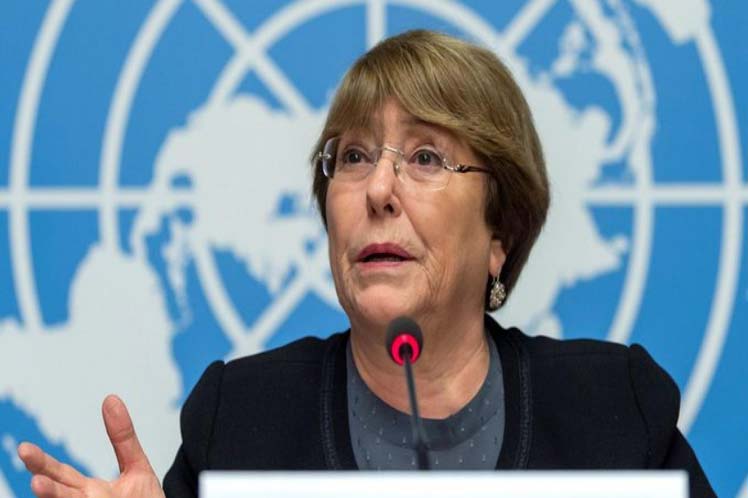Nordic Monitor
While the Turkish government has excluded political prisoners from a recently proposed amnesty bill, UN High Commissioner for Human Rights Michelle Bachelet called on UN member states to immediately release political prisoners and government critics under detention.
“Now, more than ever, governments should release every person detained without sufficient legal basis, including political prisoners and others detained simply for expressing critical or dissenting views,” Bachelet underlined yesterday.
In addition to several human right organizations, the Stockholm Center for Freedom has called on the Turkish government not to repeat its mistake and to act in line with its avowed credo that “States are for humans” by including political prisoners as well in its amnesty.
In her statement Bachelet called on governments to take urgent action to protect the health and safety of people in detention and other closed facilities, as part of overall efforts to contain the COVID-19 pandemic.
The high commissioner urged governments and relevant authorities to work quickly to reduce the number of people in detention, noting that several countries have already undertaken some positive actions.
The statement released by the Office of the High Commissioner for Human Rights (OHCHR) underlined that “the State has a particular duty to protect inmates’ physical and mental health and well-being, as set out by the UN Standard Minimum Rules for the Treatment of Prisoners (also known as the Nelson Mandela Rules).” The OHCHR also made clear that measures taken amid a health crisis should not undermine the fundamental rights of people in detention, including their rights to adequate food and water.
“Covid-19 has begun to strike prisons, jails and immigration detention centres, as well as residential care homes and psychiatric hospitals, and risks rampaging through such institutions’ extremely vulnerable populations,” said Bachelet.
“In many countries, detention facilities are overcrowded, in some cases dangerously so. People are often held in unhygienic conditions and health services are inadequate or even non-existent. Physical distancing and self-isolation in such conditions are practically impossible,” she added.
“Governments are facing huge demands on resources in this crisis and are having to take difficult decisions. But I urge them not to forget those behind bars, or those confined in places such as closed mental health facilities, nursing homes and orphanages, because the consequences of neglecting them are potentially catastrophic,” the high commissioner said.
“It is vital that governments should address the situation of detained people in their crisis planning to protect detainees, staff, visitors and of course wider society,” she stressed.
“With outbreaks of the disease, and an increasing number of deaths, already reported in prisons and other institutions in an expanding number of countries, authorities should act now to prevent further loss of life among detainees and staff,” Bachelet said, adding, “Under international human rights law, States have an obligation to take steps to prevent foreseeable threats to public health and have a duty to ensure that all who need vital medical care can receive it.”
“Restrictions on visits to closed institutions may be required to help prevent COVID-19 outbreaks, but such steps need to be introduced in a transparent way and communicated clearly to those affected. Suddenly halting contact with the outside world risks aggravating what may be tense, difficult and potentially dangerous situations,” Bachelet said. She provided examples of alternative measures taken in some countries, such as setting up expanded videoconferencing, allowing increased phone calls with family members and permitting email.
“COVID-19 poses a huge challenge to the whole of society, as governments take steps to enforce physical distancing. It is vital such measures are upheld, but I am deeply concerned that some countries are threatening to impose prison sentences for those who fail to obey. This is likely to exacerbate the grave situation in prisons and do little to halt the disease’s spread,” Bachelet warned.

European Commissioner for Human Rights Dunja Mijatović.
Dunja Mijatović, European commissioner for human rights, also called on all Council of Europe member states to review the situation of asylum seekers who have been rejected and irregular migrants in immigration detention and to release them to the maximum extent possible.
“The release of the most vulnerable should be prioritised. Since the immigration detention of children, whether unaccompanied or with their families, is never in their best interest, they should be released immediately. The authorities of member states should also refrain from issuing new detention orders to persons who are unlikely to be removed in the near future,” Mijatović stressed in her statement on March 26, 2020.
“In the face of the global Covid-19 pandemic, many member states have had to suspend forced returns of persons no longer authorised to stay on their territories, including so-called Dublin returns, and it is unclear when these might be resumed,” Mijatović said.
“Under human rights law, immigration detention for the purpose of such returns can only be lawful as long as it is feasible that return can indeed take place. This prospect is clearly not in sight in many cases at the moment. Furthermore, immigration detention facilities generally provide poor opportunities for social distancing and other measures to protect against Covid-19 infection for migrants and staff,” she stated.












